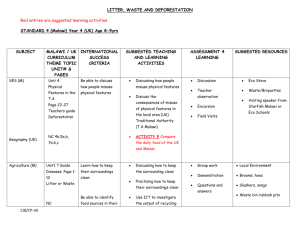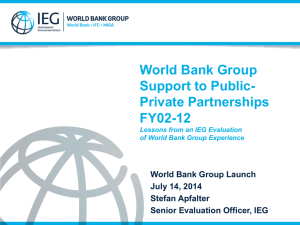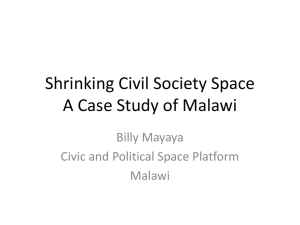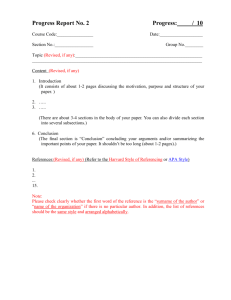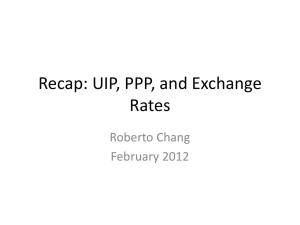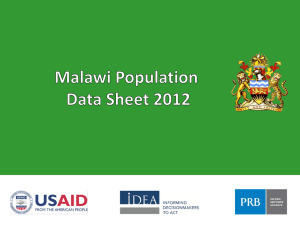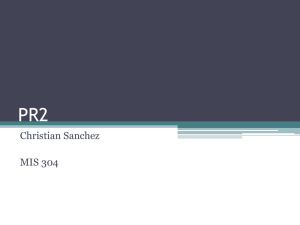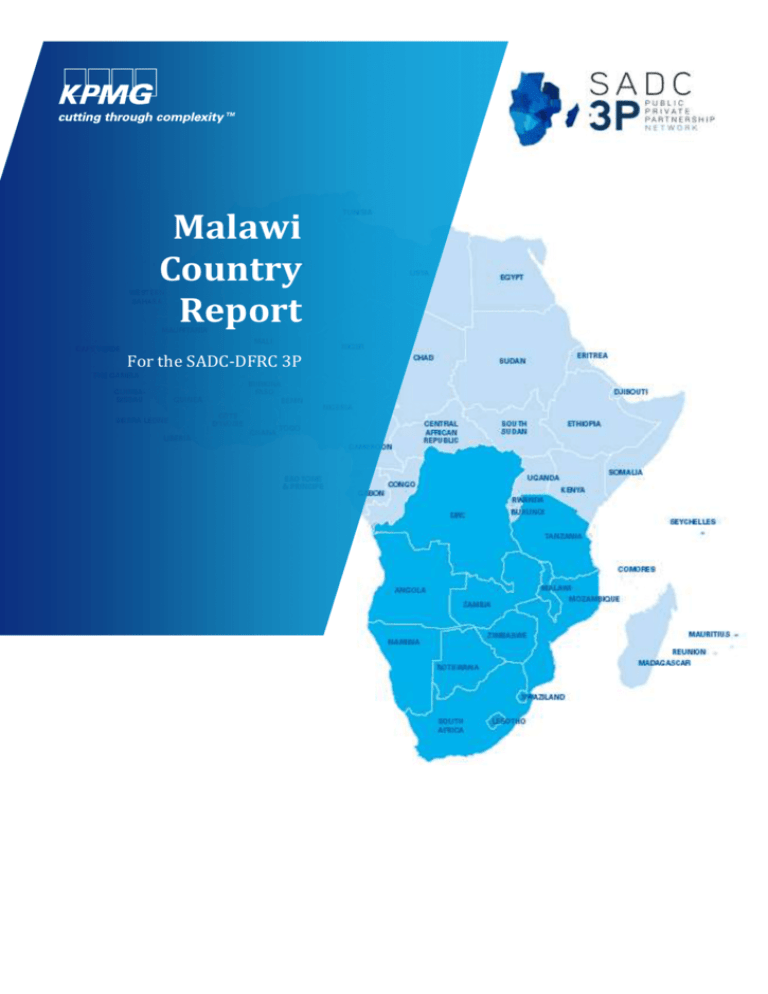
Malawi
Country
Report
For the SADC-DFRC 3P
Contents
1
Overall evaluation of Malawi’s readiness for PPPs
1
1.1
Background
1
1.2
Attractiveness of the member countries
1
1.3
Availability of domestic capital and debt funding
2
1.4
Judicial system
2
1.5
Governance and decision making
3
1.6
Ease of doing business in the member country
3
1.7
PPP environment in the member country
4
1.8
Observations
4
1.9
Conclusion
5
Malawi
1
Overall evaluation of Malawi’s readiness
for PPPs
1.1
Background
We evaluated the Member Country by looking at 6 broad categories, containing a number of subcategories. The six (‘6’) broad categories include:
■
■
■
■
■
■
Attractiveness of the member countries
Availability of domestic capital and debt funding
Judicial system
Governance and decision making
Ease of doing business in the member country
PPP environment in the member country
The information and indicators were obtained from external sources like World Bank, World Economic
Forum, IFC, Ibrahim Index of African Governance, KPMG country reports and actual visits to the member
countries (with exception to three (‘3’) countries, namely , Democratic Republic of Congo, Swaziland and
Seychelles). Where possible, KPMG utilised its in-country office to address the categories and answer
questions surrounding the projects.
Complicated travel logistics combined with the availability of the PPP commission meant no actual
country visit was undertaken, however there was significant email communication and a very productive
conference call with the PPP commission in Blantyre on 4 July 2013.
Each sub-category was rated either one (‘1’), two (‘2’), three (‘3’) or four (‘4’) based on the indicators
from various reputable sources. Where one (‘1’) and two (‘2’) refers to “Developing towards PPP
readiness” and three (‘3’) and four (‘4’) indicates a “Maturing level of PPP readiness”. Where no
information was available, no value was given. Where there was an element of subjectivity, KPMG, based
on years of experience, applied its own mind in coming up with a value. The overall broad category value
is addressed in more detail below.
1.2
Attractiveness of the member countries
Attractiveness of the member country
GDP % growth for last 3 years
Actual GDP in numbers (size of economy),
current USD$
Lending Interest rates
Source of information
4.30%
World Bank
World Bank
5,621,000,678
23.8
Inflation rate
35.80%
World Bank
www.trading economics.com/countrylist/inflation-rate
Credit Rating
Political Stable and Absence of Violence
44.3
Governance indicator, World bank
1
Malawi
Macro-Economic Environment
3.3
The Global Competitiveness Report 20122013, World Economic Forum
Attractiveness of Malawi, overall result is a two (‘2’)
Malawi has a small economy with a GDP of USD5,6bn and a low GDP per capita of USD900. It does not
have a credit rating and although it has sustained an average 4,3% growth over the past 3 years has
remained a poorly developed country with limited infrastructure and a massive infrastructure backlog.
This analysis results in an overall value of two (‘2’), Malawi is thus considered “developing” in terms of
this category.
1.3
Availability of domestic capital and debt funding
Availability of domestic capital and debt
funding
Source of information
Number of banks
4 major banks
Country visit
Number of equity investment funds
Only micro funds
Country visit
Number of pension funds
2 major funds
Country visit
3 year history of bond issuance
TBC
Country visit
Assessment of available capital (local) for
investment
Minimal/no local funds for
capital investment, small
amounts
for
working
capital/minimal
equity
investment
Country visit
Availability of domestic capital and debt funding in Malawi, overall result is a one (‘1’)
There is a very limited banking sector with 4 banks, very fragmented equity funding and only two
pension funds. No bonds have been issued and the capital market is non-existent. This analysis results in
an overall value of one (‘1’), Malawi is thus considered “developing” in terms of this category.
1.4
Judicial system
Judicial system that contributes to effective
commercial dispute resolution
Enforcing Contracts (country ranking from 1 to
185)
Source of information
144
Doing Business 2013 – The
World Bank and IFC
50.2
Governance indicator, World
bank
Rule of Law (rating from 1 to 100)
We used the key indicator ‘Enforcing Contracts’ from Doing Business as they focuses on how public
institutions function in the case of a commercial dispute1. Doing Business measures the time, cost and
procedural complexity of resolving a commercial lawsuit.
Judicial system of Malawi, overall result is a two (‘2’)
1
Doing Business 2013, the World Bank and IFC
2
Malawi
Malawi is rated 144th in the world in terms of enforcing contracts and has a rating of 50.2 out of 100 for
the application of the Rule of Law. This analysis results in an overall value of two (‘2’), Malawi is thus
considered “developing” in terms of this category.
1.5
Governance and decision making
Governance
and
decision
making in member country
Source of information
Institutions
The Global Competitiveness Report 2012-2013,
World Economic Forum
3.82
Africa’s Governance
Ibrahim Index of African Governance
56
Voice and accountability
39.4
Governance indicator
Government effectiveness
40.3
Governance indicator
Regulatory Quality
26.5
Governance indicator
Control of Corruption
45.5
Governance indicator
Governance and decision making of Malawi, overall result is a two (‘2’)
Malawi was given a rating of 56 out of 100 for governance by the Ibrahim Index of African Governance
and a government effectiveness rating of 40.3. This analysis results in an overall value of two (‘2’), Malawi
is thus considered “developing” in terms of this category.
1.6
Ease of doing business in the member country
Ease of doing business in the member country
157
Source of information
141
Doing Business 2013 – The World
Bank and IFC
175
Doing Business 2013 – The World
Bank and IFC
179
Doing Business 2013 – The World
Bank and IFC
97
Doing Business 2013 – The World
Bank and IFC
129
Doing Business 2013 – The World
Bank and IFC
82
Doing Business 2013 – The World
Bank and IFC
58
Doing Business 2013 – The World
Bank and IFC
168
Doing Business 2013 – The World
Bank and IFC
134
Doing Business 2013 – The World
Bank and IFC
Starting a business
Dealing with Construction permits
Getting electricity
Register property
Getting credit
Protecting investors
Paying taxes
Trading across borders
Resolving insolvency
Ease of doing business in Malawi, overall score is a one (‘1’)
3
Malawi
Malawi is ranked 141st in the world for Starting a Business, and 175th for Dealing with Construction
Permits. It ranked 129th in terms of access to credit, this analysis results in an overall value of one (‘1’),
Malawi is thus considered “developing” in terms of this category.
1.7
PPP environment in the member country
Enabling environment in the member country
for PPPs
Source
information
Legal system enabling PPPs in the member country
Country visit
-
Is there a presence/development of
enabling legislation ie PPP Law/
regulations etc?
There is a PPP Act (2011) and Policy
(2011).
Country visit
-
Does a policy for private participation in
the member country exist?
Yes see above.
Country visit
Public Sector appetite/capacity and experience
relating to PPPs in the member country
of
Country visit
-
Is there Political support for PPPs?
Yes, strong support.
Country visit
-
Is there a PPP focal point/ Unit in the
member country?
There has been a PPP Commission for
some years, based in Blantyre.
Country visit
-
Does an existing PPP track record in the
member country exist?
PPP is in its infancy, but the
privatisation programme started in
the 90’s included some projects with
public and private elements.
Country visit
Private sector capacity, capability and appetite
Country visit
-
Are multiple firms active in the PPP
market?
Not locally due to infancy of the PPP
model.
Country visit
-
Does capacity exist in the private sector?
As above, but it is expected that local
firms will support international ones
in tenders.
Country visit
PPP environment in the Malawi, overall score is a three (‘3’)
The PPP programme in Malawi is in its infancy, although there has been a privatisation programme for
the last 20 years that included some aspects of PPP as opposed to outright disposal. There is strong
support for PPPs and a PPP Commission in the federal government has been established. This analysis
results in an overall value of three (‘3’), Malawi is thus considered “maturing” in terms of this category.
1.8
Observations
Our results are based on the most recent verifiable information available at time of the report
Reputable external sources were used where appropriate and fact based observations were made.
The World Bank has been supporting the development of the PPP model in Malawi and developing
capacity in the PPP Commission. It commissioned a study to identify a prioritised pipeline of PPP projects
and these are the priority, over the projects identified in the RIDMP and STAP .
4
Malawi
1.9
Conclusion
The macro-environment for PPP’s in Malawi is very positive with many of the fundamentals in place, for
example a stable political environment and broad regulatory and legal environment, the necessary
specific PPP laws and policy, and an active pipeline of projects.
Furthermore there have been several years of effort and capacity building in the central PPP unit,
supported by the World Bank and appointed consultants. There is a very recently published report of
prioritised pipeline projects, and the impression is that traction is being made. Therefore the country
appears very attractive for the development of PPP’s and the suggestion is the SADC PPP unit consider
supporting a project (see sector recommendations). Overall Malawi is thus considered “developing” in
terms of this category.
5
© 2013 KPMG Services (Pty) Ltd, a South African company and a member firm of the KPMG
network of independent member firms affiliated with KPMG International Cooperative (“KPMG
International”), a Swiss entity. All rights reserved.
The information contained herein is of a general nature and is not intended to address the
circumstances of any particular individual or entity. Although we endeavour to provide
accurate and timely information, there can be no guarantee that such information is accurate as
of the date it is received or that it will continue to be accurate in the future. No one should act
on such information without appropriate professional advice after a thorough examination of
the particular situation.
The KPMG name, logo and “cutting through complexity” are registered trademarks or
trademarks of KPMG International.



